- Home
- Jodi Picoult
House Rules: A Novel Page 2
House Rules: A Novel Read online
Page 2
“Stupid English.”
“English isn’t stupid,” I say.
“Well, my English teacher is.” He makes a face. “Mr. Franklin assigned an essay about our favorite subject, and I wanted to write about lunch, but he won’t let me.”
“Why not?”
“He says lunch isn’t a subject.”
I glance at him. “It isn’t.”
“Well,” Jacob says, “it’s not a predicate, either. Shouldn’t he know that?”
I stifle a smile. Jacob’s literal reading of the world can be, depending on the circumstances, either very funny or very frustrating. In the rearview mirror, I see him press his thumb against the car window. “It’s too cold for fingerprints,” I say offhandedly—a fact he’s taught me.
“But do you know why?”
“Um.” I look at him. “Evidence breaks down when it’s below freezing?”
“Cold constricts the sweat pores,” Jacob says, “so excretions are reduced, and that means matter won’t stick to the surface and leave a latent print on the glass.”
“That was my second guess,” I joke.
I used to call him my little genius, because even when he was small he’d spew forth an explanation like that one. I remember once, when he was four, he was reading the sign for a doctor’s office when the postman walked by. The guy couldn’t stop staring, but then again, it’s not every day you hear a preschooler pronounce the word gastroenterology, clear as a bell.
I pull into the parking lot. I ignore a perfectly good parking spot because it happens to be next to a shiny orange car, and Jacob doesn’t like the color orange. I can feel him draw in his breath and hold it until we drive past. We get out of the car, and Jacob runs for a cart; then we walk inside.
The spot that the Free Sample Lady usually occupies is empty.
“Jacob,” I say immediately, “it’s not a big deal.”
He looks at his watch. “It’s eleven-fifteen. She comes at eleven and leaves at twelve.”
“Something must have happened.”
“Bunion surgery,” calls an employee, who is stacking packages of carrots within earshot. “She’ll be back in four weeks.”
Jacob’s hand begins to flap against his leg. I glance around the store, mentally calculating whether it would cause more of a scene to try to get Jacob out of here before the stimming turns into a full-blown breakdown or whether I can talk him through this. “You know how Mrs. Pinham had to leave school for three weeks when she got shingles, and she couldn’t tell you beforehand? This is the same thing.”
“But it’s eleven-fifteen,” Jacob says.
“Mrs. Pinham got better, right? And everything went back to normal.”
By now, the carrot man is staring at us. And why shouldn’t he? Jacob looks like a totally normal young man. He’s clearly intelligent. But having his day disrupted probably makes him feel the same way I would if I was suddenly told to bungee off the top of the Sears Tower.
When a low growl rips through Jacob’s throat, I know we are past the point of no return. He backs away from me, into a shelf full of pickle jars and relishes. A few bottles fall to the floor, and the breaking glass sends him over the edge. Suddenly Jacob is screaming—one high, keening note that is the soundtrack of my life. He moves blindly, striking out at me when I reach for him.
It is only thirty seconds, but thirty seconds can last forever when you are the center of everyone’s scrutiny; when you are wrestling your six-foot-tall son down to the linoleum floor and pinning him with your full body weight, the only kind of pressure that can soothe him. I press my lips close to his ear. “I shot the sheriff,” I sing. “But I didn’t shoot no deputy …”
Since he was little, those Bob Marley lyrics have soothed him. There were times I played that song twenty-four hours a day just to keep him calm; even Theo knew all the verses before he was three. Sure enough, the tension seeps out of Jacob’s muscles, and his arms go limp at his sides. A single tear streaks from the corner of his eye. “I shot the sheriff,” he whispers, “but I swear it was in self-defense.”
I put my hands on either side of his face and force him to meet my eyes. “Okay now?”
He hesitates, as if he is taking a serious inventory. “Yes.”
I sit up, inadvertently kneeling in the puddle of pickle juice. Jacob sits up, too, and hugs his knees to his chest.
A crowd has gathered around us. In addition to the carrot man, the manager of the store, several shoppers, and twin girls with matching constellations of freckles on their cheeks are all staring down at Jacob with that curious mix of horror and pity that follows us like a dog nipping at our heels. Jacob wouldn’t hurt a fly, literally or figuratively—I’ve seen him cup his hands around a spider during a three-hour car ride so that, at our destination, he could set it free outside. But if you are a stranger and you see a tall, muscular man knocking over displays, you don’t look at him and assume he’s frustrated. You think he’s violent.
“He’s autistic,” I snap. “Do you have any questions?”
I’ve found that anger works best. It’s the electric shock they need to tear their gaze away from the train wreck. As if nothing’s happened, the shoppers go back to sifting through the navel oranges and bagging their bell peppers. The two little girls dart down the dairy aisle. The carrot man and the manager do not make eye contact, and that suits me just fine. I know how to handle their morbid curiosity; it’s their kindness that might break me.
Jacob shuffles along behind me as I push the cart. His hand is still twitching faintly at his side, but he’s holding it together.
My biggest hope for Jacob is that moments like this won’t happen.
My biggest fear: that they will, and I won’t always be there to keep people from thinking the worst of him.
Theo
I’ve had to get twenty-four stitches on my face, thanks to my brother. Ten of them left a scar cutting through my left eyebrow, after the time that Jacob knocked over my high chair when I was eight months old. The other fourteen stitches were on my chin, Christmas 2003, when I got so excited about some stupid gift that I crumpled the wrapping paper, and Jacob went ballistic at the sound. The reason I’m telling you this has nothing to do with my brother, though. It’s because my mother will tell you Jacob’s not violent, but I am living proof that she’s kidding herself.
I am supposed to make exceptions for Jacob; it’s one of our unwritten house rules. So when we need to take a detour away from a detour sign (how ironic is that?) since it’s orange and freaks Jacob out, that trumps the fact that I’m ten minutes late for school. And he always gets the shower first, because a hundred billion years ago when I was still a baby Jacob took the first shower, and he can’t handle having his routine messed up. And when I turned fifteen and made an appointment to get my learner’s permit at the DMV—an appointment that got canceled when Jacob had a meltdown over buying a pair of new sneakers—I was expected to understand that these things happen. The problem is, something happened the next three times I tried to get my mom to take me to the DMV and, finally, I just stopped asking. At this rate, I’ll be riding my skateboard till I’m thirty.
Once, when Jacob and I were little, we were playing in a pond near our house with an inflatable boat. It was my job to watch Jacob, even though he was three years older than I am and has had just as many swimming lessons as I have. We overturned the boat and swam up underneath it, where the air was heavy and wet. Jacob started talking about dinosaurs, which he was into at the time, and he wouldn’t shut up. Suddenly I began to panic. He was sucking up all the oxygen in that tiny space. I pushed at the boat, trying to lift it off us, but the plastic had created some kind of seal on the surface of the water—which only made me panic even more. And sure, with twenty-twenty hindsight, I know I could have swum out from underneath the boat, but at that moment it didn’t occur to me. All I knew, at the time, was that I couldn’t breathe. When people ask me what it’s like growing up with a brother who has Asperger’s, tha
t’s what I always think of, even though the answer I give out loud is that I’ve never known anything different.
I’m no saint. There are times I’ll do things to drive Jacob crazy, because it’s just so damn easy. Like when I went into his closet and mixed up all his clothes. Or when I hid the toothpaste cap so that he couldn’t put it back on when he was done brushing his teeth. But then I wind up feeling bad for my mom, who usually bears the brunt of one of Jacob’s meltdowns. There are times I hear her crying, when she thinks Jacob and I are asleep. That’s when I remember that she didn’t sign up for this kind of life, either.
So I run interference. I’m the one who physically drags Jacob away from a conversation when he’s starting to freak people out by being too intense. I’m the one who tells him to stop flapping when he’s nervous on the bus, because it makes him look like a total nutcase. I’m the one who goes to his classes before I go to my own, just to let the teachers know that Jacob had a rough morning because we unexpectedly ran out of soy milk. In other words, I act like the big brother, even though I’m not. And during the times when I think it’s not fair, when my blood feels like lava, I step away. If my room isn’t far enough, I get on my skateboard and tool somewhere—anywhere that isn’t the place I am supposed to call home.
That’s what I do this afternoon, after my brother decides to cast me as the perp in his fake crime scene. I’ll be honest with you—it wasn’t the fact that he took my sneakers without asking or even that he stole hair out of my brush (which is, frankly, Silence of the Lambs creepy). It was that when I saw Jacob in the kitchen with his corn-syrup blood and his fake head injury and all the evidence pointing to me, for a half a second, I thought: I wish.
But I’m not allowed to say my life would be easier without Jacob around. I’m not even allowed to think it. It’s another one of those unwritten house rules. So I grab my coat and head south, although it is twenty degrees outside and the wind feels like knives on my face. I stop briefly at the skateboarding park, the only place in this stupid town where the cops even let you skate anymore, although it’s totally useless during the winter, which is like nine months of the year in Townsend, Vermont.
It snowed last night, about two inches, but there’s a guy with a snowskate trying to Ollie off the stairs when I get there. His friend is holding a cell phone, recording the trick. I recognize them from school, but they’re not in my classes. I’m sort of the antiskater personality. I take AP everything, and I have a 3.98 average. Of course, that makes me a freak to the skating crowd, just like the way I dress and the fact that I like to skate make me a freak to the honors crowd.
The kid who’s skating falls down on his ass. “I’m putting that on YouTube, bro,” his friend says.
I bypass the skate park and head through town, to this one street that curls like a snail. In the very center is a gingerbread house—I guess you call them Victorians. It’s painted purple and there’s a turret on one side. I think that’s what made me stop the first time—I mean, who the hell has a turret on their house, besides Rapunzel? But the person who lives in that turret is a girl who’s probably ten or eleven, and she has a brother who’s about half her age. Their mom drives a green Toyota van, and their dad must be some kind of doctor, because twice now I’ve seen him come home from work wearing scrubs.
I’ve been going there a lot, lately. Usually I crouch down in front of the bay window that looks into the living room. I can see pretty much everything from there—the dining room table, where the kids do their homework. The kitchen, where the mom cooks dinner. Sometimes she opens the window a crack and I can almost taste what they’re eating.
This afternoon, though, nobody is home. That makes me feel cocky. Even though it’s broad daylight, even though there are cars going up and down the street, I walk behind the house and sit down on the swing set. I twist the chains around and then let them untangle, even though I am way too old for this kind of stuff. Then I walk up to the back porch and try the door.
It opens.
It’s wrong, I know that. But all the same, I go inside.
I take off my shoes because it’s the polite thing to do. I leave them on a mat in the mudroom and walk into the kitchen. There are cereal bowls in the sink. I open the fridge and look at the stacked Tupperware. There’s leftover lasagna.
I take out a jar of peanut butter and sniff inside. Is it just my imagination, or does it smell better than the Jif we have at our house?
I stick my finger in and take a taste. Then, with my heart pounding, I carry the jar to the counter—plus another jar of Smucker’s. I take two slices of bread from the loaf on the counter and rummage in the drawers till I find the silverware. I make myself a PB&J sandwich as if it’s something I do in this kitchen all the time.
In the dining room, I sit down in the chair that the girl always sits in for meals. I eat my sandwich and picture my mother coming out of the kitchen, carrying a big roast turkey on a platter. “Hey, Dad,” I say out loud to the empty seat on my left, pretending that I have a real father instead of just a guilty sperm donor who sends a check every month.
How’s school? he would ask.
“I got a hundred on my bio test.”
That’s incredible. Wouldn’t be surprised if you wind up in med school, like I did.
I shake my head, clearing it. Either I’ve imagined myself into a TV sitcom or I have some kind of Goldilocks complex.
Jacob used to read to me at night. Well, not really. He read to himself, and he wasn’t reading as much as he was reciting what he’d memorized, and I just happened to be in the same general geographic location, so I couldn’t help but listen. I liked it, though. When Jacob talks, his voice rolls up and down as if every sentence is a song, which sounds really strange in normal conversation but somehow works when it’s a fairy tale. I remember hearing the story about Goldilocks and the Three Bears and thinking she was such a loser. If she’d played her cards right, she might have been able to stay.
Last year, when I was a freshman at the regional high school, I got to start over. There were kids from other towns who knew nothing about me. I hung out the first week with these two guys, Chad and Andrew. They were in my Methods class and seemed pretty cool, plus they lived in Swanzey instead of Townsend and had never met my brother. We laughed about the way our science teacher’s pants were hemmed two inches too short and sat together in the caf at lunch. We even made plans to check out a movie if a good one was playing on the weekend. But then Jacob showed up in the caf one day because he’d finished his physics packet in some freakishly short amount of time and his teacher had dismissed him, and of course he made a beeline for me. I introduced him and said he was an upperclassman. Well, that was my first mistake—Chad and Andrew were so psyched at the thought of hanging out with an upperclassman that they started asking Jacob questions, like what grade he was in and if he was on a sports team. “Eleventh,” Jacob said, and then he told them he didn’t really like sports. “I like forensics,” he said. “Have you ever heard of Dr. Henry Lee?” He then yapped for ten straight minutes about the Connecticut pathologist who’d worked on major cases like O. J. Simpson and Scott Peterson and Elizabeth Smart. I think he lost Chad and Andrew somewhere around the tutorial on blood spatter patterns. Needless to say, the next day when we picked lab partners in Methods, they ditched me fast.
I’ve finished my sandwich, so I get up from the dining room table and head upstairs. The first room at the top is the boy’s, and there are dinosaur posters all over the walls. The sheets are covered with fluorescent pterodactyls, and a remote-control T. rex lies on its side on the floor. For a moment, I stop dead. There was a time when Jacob was as crazy about dinosaurs as he is now about forensic science. Could this little boy tell you about the therizinosaurid found in Utah, with fifteen-inch claws that look like something out of a teen slasher flick? Or that the first nearly complete dinosaur skeleton—a hadrosaur—was found in 1858 in New Jersey?
No, he’s just a kid—not a kid with Asperger
’s. I can tell, just by looking into the windows at night and watching the family. I know, because that kitchen with its warm yellow walls is a place I want to be, not somewhere I’d run away from.
I suddenly remember something. That day when Jacob and I were playing in the pond underneath the inflatable boat, when I started to freak out because I couldn’t breathe and the boat was stuck on top of us? He somehow broke the suction-cup seal of the boat on the surface of the water and wrapped his arms around my chest, holding me up high so that I could swallow huge gulps of air. He dragged me to the shore, and he sat beside me shivering until I could figure out how to speak again. It’s the last time I remember Jacob watching out for me, instead of the other way around.
In the bedroom where I’m standing, there’s a whole wall of shelves filled with electronic games. Wii and Xbox, mostly, with a few Nintendo DS tossed in for good measure. We don’t have any gaming systems; we can’t afford them. The crap Jacob has to take at breakfast—a whole extra meal of pills and shots and supplements—costs a fortune, and I know that my mother stays up nights sometimes doing freelance editing jobs just so that she can pay Jess, Jacob’s social skills tutor.
I hear the hum of a car on the quiet street, and when I peek out the window I see it: the green van turning in to the driveway. I fly down the stairs and through the kitchen, out the back door. I dive into the bushes, where I hold my breath and watch the boy spill out of the van first, wearing hockey gear. Then his sister gets out, and finally his parents. His father grabs a bag of equipment from the hatch, and then they all disappear into the house.
I walk to the road and skate away from the gingerbread house. Underneath my coat is the Wii game I grabbed at the last minute—some Super Mario challenge. I can feel my heart pounding against it.
I can’t play it. I don’t even really want it. The only reason I took it is because I know they’ll never even know it’s missing. How could they, when they’ve got so much?

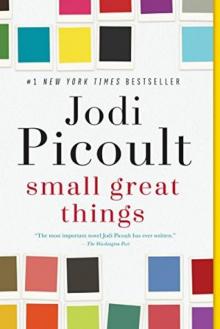 Small Great Things
Small Great Things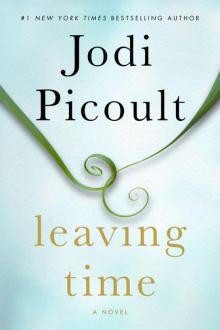 Leaving Time
Leaving Time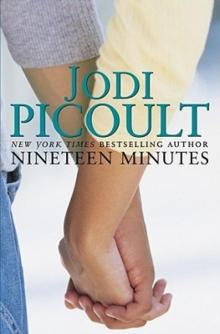 Nineteen Minutes
Nineteen Minutes Larger Than Life
Larger Than Life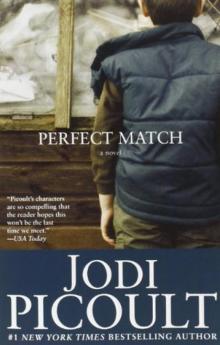 Perfect Match
Perfect Match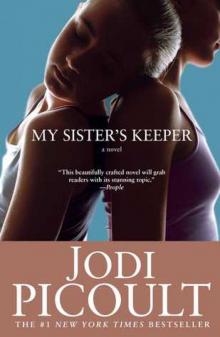 My Sister's Keeper
My Sister's Keeper The Pact
The Pact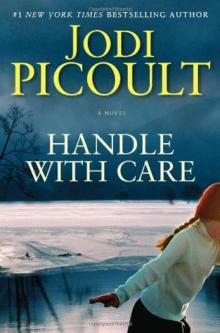 Handle With Care
Handle With Care Songs of the Humpback Whale
Songs of the Humpback Whale Mermaid
Mermaid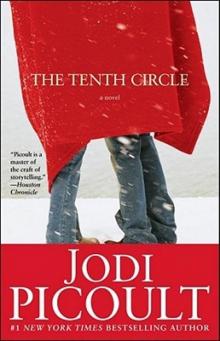 The Tenth Circle
The Tenth Circle The Color War
The Color War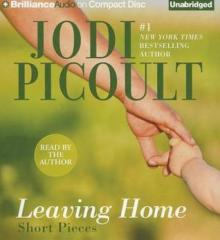 Leaving Home: Short Pieces
Leaving Home: Short Pieces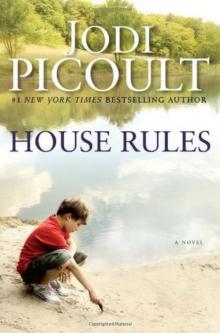 House Rules
House Rules Lone Wolf
Lone Wolf The Storyteller
The Storyteller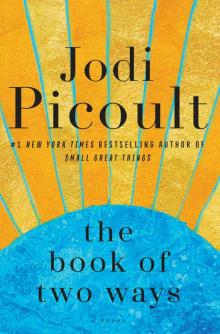 The Book of Two Ways
The Book of Two Ways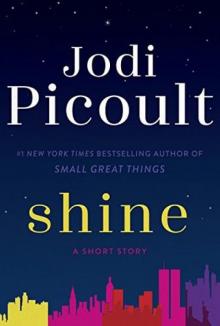 Shine
Shine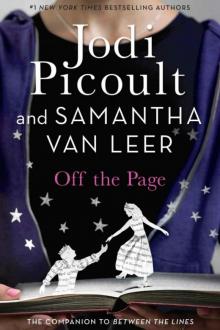 Off the Page
Off the Page Sing You Home
Sing You Home Second Glance: A Novel
Second Glance: A Novel Mercy
Mercy Vanishing Acts
Vanishing Acts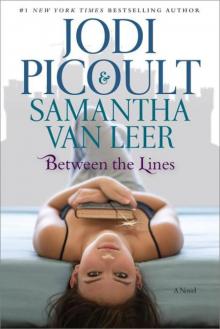 Between the Lines
Between the Lines Plain Truth
Plain Truth Salem Falls
Salem Falls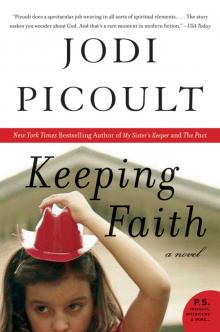 Keeping Faith
Keeping Faith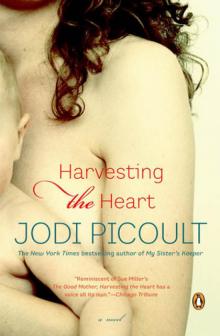 Harvesting the Heart
Harvesting the Heart Change of Heart
Change of Heart Where There's Smoke
Where There's Smoke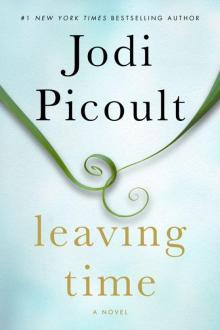 Leaving Time: A Novel
Leaving Time: A Novel Over the Moon
Over the Moon House Rules: A Novel
House Rules: A Novel The Jodi Picoult Collection #2
The Jodi Picoult Collection #2 Leaving Home: Short Pieces (Kindle Single)
Leaving Home: Short Pieces (Kindle Single)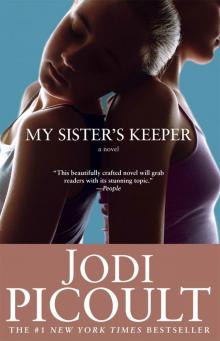 My Sister's Keeper: A Novel
My Sister's Keeper: A Novel![Mermaid [Kindle in Motion] (Kindle Single) Read online](http://i1.bookreadfree.com/i1/04/03/mermaid_kindle_in_motion_kindle_single_preview.jpg) Mermaid [Kindle in Motion] (Kindle Single)
Mermaid [Kindle in Motion] (Kindle Single) The Jodi Picoult Collection #4
The Jodi Picoult Collection #4 Sing You Home: A Novel
Sing You Home: A Novel The Jodi Picoult Collection
The Jodi Picoult Collection Lone Wolf A Novel
Lone Wolf A Novel Second Glance
Second Glance Larger Than Life (Novella)
Larger Than Life (Novella) The Jodi Picoult Collection #3
The Jodi Picoult Collection #3